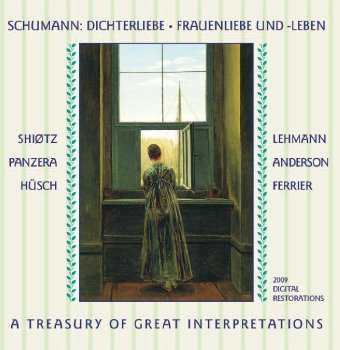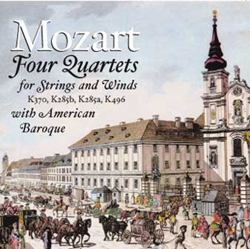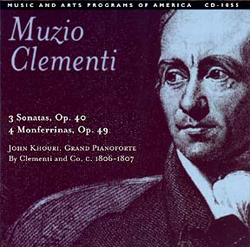Description
DICHTERLIEBE · FRAUENLIEBE UND -LEBEN. A TREASURY OF GREAT INTERPRETATIONS. CD 1: (78:35) Dichterliebe, Op. 48: 3 recordings. Aksel Schiøtz – Tenor; Gerald Moore – Piano (recorded 10 January 1946, studio). Charles Panzera – Baritone; Alfred Cortot – Piano (recorded 17 June 1935, studio). Gerhard Hüsch – Baritone; Hanns Udo Müller – Piano (recorded 29, 30 January 1936, studio). CD 2: (62:24) Frauenliebe und -leben, Op. 42: 3 recordings. Lotte Lehmann – Soprano; Paul Ulanowsky – Piano (recorded 20 January 1946, New York, live). Marian Anderson – Contralto; Franz Rupp – Piano (recorded 29, 30 March 1950, studio). Kathleen Ferrier – Contralto; Bruno Walter – Piano (recorded 7 September 1949, Edinburgh Festival, live). Sound restorations by Lani Spahr (2009). Note by Tully Potter. ADD. UPC# 0-17685-12352 8.
BUZZ: Tully Potter writes in his note: "In his enormous enthusiasm, backed up by his considerable skill, Schumann more or less invented the Romantic Lied, just as Schubert had virtually defined the Classical Lied. The two cycles featured here, Dichterliebe Op.48 for a male voice and Frauenliebe und -leben Op.42 for a female voice, are perhaps the most personal products of 1840.
Aksel Schiøtz (1906-75) is ideal in his delicate understatement – with Schiøtz, less is always more. His 'speaking' delivery, plangently lyrical tone and economical phrasing are exemplary. This is the essential historic tenor version of Dichterliebe, as the artists are true partners, equals before the shrine of Schumann's genius. If Schiøtz and Moore provide the perfect introduction to Dichterliebe, it is the version by Charles Panzéra and Alfred Cortot that I always hear in my mind's ear when I am listening to other singers interpret Schumann's cycle. Swiss born and French trained, Charles Panzéra (1896-1976) was perhaps the finest modern exponent of the voice type known as baryton-Martin. He did not have a big tone but the basic quality was very beautiful and he had the rare ability to caress a phrase and imprint it on the mind of the listener. Again and again in Schumann's songs, Panzéra finds the ideal balance between poetry and motion, so that his very individual articulation becomes an integral element of the cycle as it unfolds. — Gerhard Hüsch (1901-84) had the loveliest voice among German baritones of the last century, with the possible exception of Herbert Janssen, and like Schiøtz was able to convey the beauty of a song without making a meal of it. Schumann seems to have had a tenor in mind for Dichterliebe and a baritone voice can drag the music down; but despite having an ampler tone than Panzéra, Hüsch manages to keep the phrases airborne.
Sincerity and intensity are vital assets for any interpreter of Frauenliebe und -leben, if the words are not to seem slightly mawkish in places. Fortunately those two attributes are possessed in full measure by the three grand ladies who portray Schumann's and Chamisso's devoted heroine here. Somewhat surprisingly, perhaps because she had a long afterlife as a presenter of master classes, Lotte Lehmann (1888-1976) is now recalled as a great interpreter of Lieder, though she turned to art-song relatively late in her career after decades in opera. In her last years, she triumphed over shortness of breath with the fervour and commitment of her singing – precisely the qualities she had brought to her operatic portraits, in fact. Recorded live at a Town Hall recital for The New Friends in 1946, with Ulanowsky at the piano. She depicts the protagonist of Frauenliebe in the raw, with the emotions right on the surface. — Marian Anderson (1897-1993), from Philadelphia, was one of the more enterprising recitalists of the 1930s, seeking out some unusual repertoire such as Sibelius and Kilpinen songs, but her home territory comprised spirituals – to which like Hayes, Robeson and Maynor she brought both joy and dignity – and German Lieder. Her large voice might be thought too cumbersome for the simple statements of Freuenliebe, yet in practice her vast range of colour, and her ability to control every facet of her vibrant tone, see her home. Her tempi never drag, even when she is relishing every word. Franz Rupp, who left Germany by choice in the 1930s and found a sympathetic billet as Anderson's regular accompanist from 1941, is a discriminating partner and comes into his own in the postlude. The recorded sound is outstanding for its period. — Lancashire-born Ferrier (1912-53) was rather a late starter, not making her professional debut until she was 26; and at first she gravitated naturally to the English oratorio circuit. Although she tackled Liederquite early, singing Frauenliebe in German from 1943, her encounter with Bruno Walter after the war was a major factor in her shift towards becoming a great interpreter of Schubert, Schumann and Mahler; so it is entirely apt that he accompanies her in this famous but long unavailable concert performance from the 1949 Edinburgh Festival."
Disc 1 Sound Clips (MP3):
1. Nr. 1- Im wunderschonen Monat Mai
2. Nr. 2- Aus meinen Tranen spriessen
3. Nr. 3- Die Rose, die Lilie, die Taube, die Sonne
4. Nr. 4- Wenn ich in deine Augen seh
5. Nr. 5- Ich will meine Seele tauchen
6. Nr. 6- Im Rhein, im heiligen Strome
8. Nr. 8- Und wussten’s die Blumen, die kleinen
9. Nr. 9- Das ist ein FlÂten und Geigen
10. Nr. 10- Hor’ ich das Liedchen klingen
11. Nr. 11- Ein Jungling liebt ein Madchen
12. Nr 12- Am leuchtenden Sommermorgen
13. Nr. 13- Ich hab’ im Traum geweinet
14. Nr. 14- Allnachtlich im Traume
15. Nr. 15- Aus alten Marchen winkt es
16. Nr. 16- Die alten, bosen Lieder
17. Nr. 1- Im wunderschonen Monat Mai
18. Nr. 2- Aus meinen Tranen spriessen
19. Nr. 3- Die Rose, die Lilie, die Taube, die Sonne
20. Nr. 4- Wenn ich in deine Augen seh
21. Nr. 5- Ich will meine Seele tauchen
22. Nr. 6- Im Rhein, im heiligen Strome
24. Nr. 8- Und wÂssten’s die Blumen, die kleinen
25. Nr. 9- Das ist ein Floten und Geigen
26. Nr. 10- Hor’ ich das Liedchen klingen
27. Nr. 11- Ein Jungling liebt ein Madchen
28. Nr. 12- Am leuchtenden Sommermorgen
29. Nr. 13- Ich hab’ im Traum geweinet
30. Nr. 14- Allnachtlich im Traume
31. Nr. 15- Aus alten Marchen winkt es
32. Nr. 16- Die alten, bosen Lieder
Disc 2 Sound Clips (MP3):
1. Nr. 1- Seit ich ihn gesehen
2. Nr. 2- Er, der Herrlichste von allen
3. Nr. 3- Ich kann’s nicht fassen, nicht glauben
4. Nr. 4- Du Ring an meinem Finger
5. Nr. 5- Helft mir, ihr Schwestern
6. Nr. 6- Susser Freund, du blickest mich verwundert an
7. Nr. 7- An meinem Herzen, an meiner Brust
8. Nr. 8- Nun hast du mir den ersten Schmerz getan
9. Nr. 1- Seit ich ihn gesehen
10. Nr. 2- Er, der Herrlichste von allen
11. Nr. 3- Ich kann’s nicht fassen, nicht glauben
12. Nr. 4- Du Ring an meinem Finger
13. Nr. 5- Helft mir, ihr Schwestern
14. Nr. 6- SÂsser Freund, du blickest mich verwundert an
15. Nr. 7- An meinem Herzen, an meiner Brust
16. Nr. 8- Nun hast du mir den ersten Schmerz getan
17. Nr. 1- Seit ich ihn gesehen
18. Nr. 2- Er, der Herrlichste von allen
19. Nr. 3- Ich kann’s nicht fassern
20. Nr. 4- Du Ring an meinem Finger
21. Nr. 5- Helft mir, ihr Schwestern
22. Nr. 6- Susser Freund, du blickest mich verwundert an








Reviews
There are no reviews yet.